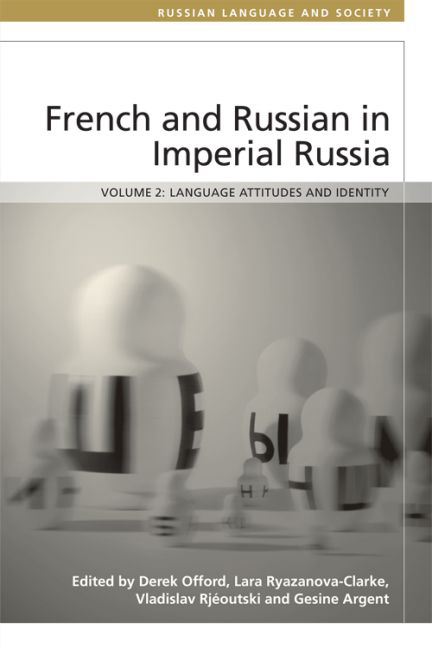Book contents
- Frontmatter
- Contents
- Preface
- Note on Dates, Transliteration and Other Editorial Practices
- Abbreviations Used in the Text, Notes and References
- Dates of Reigns in Eighteenth- and Nineteenth-Century Russia
- Dedication
- Introduction
- 1 The Pan-European Justification of a Multilingual Russian Society in the Late Eighteenth Century
- 2 Princess Dashkova and the Politics of Language in Eighteenth-Century Russia
- 3 Plating ‘Russian Gold’ with ‘French Copper’: Aleksandr Sumarokov and Eighteenth-Century Franco-Russian Translation
- 4 Francophone Culture in Russia Seen through the Russian and French Periodical Press
- 5 Linguistic Gallophobia in Russian Comedy
- 6 The Linguistic Debate between Karamzin and Shishkov: Evaluating Russian–French Language Contact
- 7 Language and Conservative Politics in Alexandrine Russia
- 8 Seduction, Subterfuge, Subversion: Ivan Krylov's Rewriting of Molière
- 9 The French Language of Fashion in Early Nineteenth-Century Russia
- 10 Russian ‘Translations’ of Patrie in the Napoleonic Period
- 11 Treatment of Francophonie in Pushkin's Prose Fiction
- 12 Love à la mode: Russian Words and French Sources
- Conclusion
- Notes on contributors
- Index
12 - Love à la mode: Russian Words and French Sources
Published online by Cambridge University Press: 25 October 2017
- Frontmatter
- Contents
- Preface
- Note on Dates, Transliteration and Other Editorial Practices
- Abbreviations Used in the Text, Notes and References
- Dates of Reigns in Eighteenth- and Nineteenth-Century Russia
- Dedication
- Introduction
- 1 The Pan-European Justification of a Multilingual Russian Society in the Late Eighteenth Century
- 2 Princess Dashkova and the Politics of Language in Eighteenth-Century Russia
- 3 Plating ‘Russian Gold’ with ‘French Copper’: Aleksandr Sumarokov and Eighteenth-Century Franco-Russian Translation
- 4 Francophone Culture in Russia Seen through the Russian and French Periodical Press
- 5 Linguistic Gallophobia in Russian Comedy
- 6 The Linguistic Debate between Karamzin and Shishkov: Evaluating Russian–French Language Contact
- 7 Language and Conservative Politics in Alexandrine Russia
- 8 Seduction, Subterfuge, Subversion: Ivan Krylov's Rewriting of Molière
- 9 The French Language of Fashion in Early Nineteenth-Century Russia
- 10 Russian ‘Translations’ of Patrie in the Napoleonic Period
- 11 Treatment of Francophonie in Pushkin's Prose Fiction
- 12 Love à la mode: Russian Words and French Sources
- Conclusion
- Notes on contributors
- Index
Summary
Love appeared in Russia quite late, somewhere around the end of the seventeenth century, and at first it had virtually no voice or words with which to express itself. I do not mean, of course, that up until then Russians had lived like wild animals and that there had been no love among them. They seem even to have managed somehow to speak about love, and the love-songs of folklore may partly reflect that capacity. However, folklore existed outside culture (or outside high culture, if you like), and there was no cultural tradition of amorous relationships or the words to go with them: the Russians had no troubadours, no Petrarch, not even a Boccaccio. When love did invade public space, in the Petrine age, the art of courtship and gallant dialogue was almost entirely lacking. The secretary of the Prussian Embassy in St Petersburg, Johann Vockerodt, wrote in the 1720s that women (he had in mind the upper social spheres) had grown fond of the new-found freedom during the reign of Peter and that a surfeit of this freedom was dangerous and undesirable ‘if their matrimonial union [was] to remain firm, for their passions are mostly ardent and are very rarely held in check by upbringing, so that when they fall in love their romantic adventures usually have a very rapid outcome’ (Maikov 1889: 202). L'heure du berger (literally, ‘the shepherd's hour’, ‘the gloaming’, that is to say the auspicious hour for lovers) was but a moment in Russia, which may explain why this concept was not assimilated by the Russian lexicon of love.
Love was not merely a feeling, it was also a skill, and Russians would have to learn it. The main teachers of love in Europe at the time that interests me here were the French. Translations from French were becoming teaching aids. The earliest and most important of these was a translation of Paul Tallement's allegorical novel Journey to the Island of Love (Voyage de l’île d'Amour), which appeared in France in 1663 and was published in Vasilii Trediakovskii's Russian translation in 1730. It is with this work that I shall begin. At the risk of somewhat oversimplifying the actual historical situation, we may say that Trediakovskii's translation records the first phase in the formation of gallant language in Russia.
- Type
- Chapter
- Information
- French and Russian in Imperial RussiaLanguage Attitudes and Identity, pp. 214 - 241Publisher: Edinburgh University PressPrint publication year: 2015

